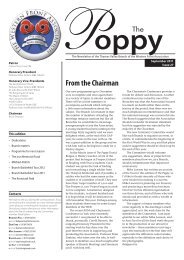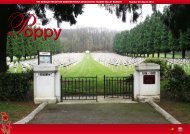The above group photo is of the staff - The Western Front Association
The above group photo is of the staff - The Western Front Association
The above group photo is of the staff - The Western Front Association
You also want an ePaper? Increase the reach of your titles
YUMPU automatically turns print PDFs into web optimized ePapers that Google loves.
As <strong>the</strong> Germans retreated <strong>the</strong>y<br />
destroyed <strong>the</strong> railways but after a long<br />
march (over 400 miles) <strong>the</strong> Allies were<br />
victorious and <strong>the</strong> Germans surrendered<br />
on July 9<br />
very now and again.<br />
th 1915.<br />
Th<strong>is</strong> very interesting talk again illustrated<br />
<strong>the</strong> point that <strong>the</strong>re <strong>is</strong> much to be learnt<br />
from escaping <strong>the</strong> confines <strong>of</strong> <strong>the</strong><br />
<strong>Western</strong> <strong>Front</strong> e<br />
(Andrew Brooks)<br />
Haig: February 2012 (26 attended)<br />
Peter Hart vigorously<br />
defended Haig’s<br />
generalship,<br />
saying that Lloyd George,<br />
Winston Churchill and Basil Liddell-Hart<br />
were<br />
responsible for wrecking h<strong>is</strong><br />
reputation after h<strong>is</strong> death. Haig <strong>is</strong><br />
m<strong>is</strong>understood and most working<br />
h<strong>is</strong>torians have a different view <strong>of</strong> Haig to<br />
that held by most <strong>of</strong> <strong>the</strong> general public,<br />
who think that First World War generals<br />
were stupid, insensitive brutes.<br />
Haig believed that he should<br />
concentrate on <strong>the</strong> fighting on <strong>the</strong><br />
<strong>Western</strong> <strong>Front</strong>. However he was<br />
hampered by an insufficiently trained<br />
Kitchener’ s Army and by not having<br />
complete control, as at Arras in 1917<br />
when he was under Nivelle.<br />
<strong>The</strong> many critic<strong>is</strong>ms <strong>of</strong> Haig include<br />
that he was inarticulate, obsessed with<br />
religion, ignorant <strong>of</strong> modern warfare and<br />
a believer in attrition. Peter dealt with all<br />
<strong>the</strong> critic<strong>is</strong>ms providing evidence in<br />
support and stated that 1918 was <strong>the</strong><br />
year which proved Haig’s ability.<br />
Haig made m<strong>is</strong>takes but he knew what<br />
he was doing and held h<strong>is</strong> nerve. At <strong>the</strong><br />
end <strong>of</strong> <strong>the</strong> war he spent <strong>the</strong> rest <strong>of</strong> h<strong>is</strong> life<br />
working for <strong>the</strong> Brit<strong>is</strong>h Legion and made it<br />
rank free.<br />
Peter concluded that Haig was a great<br />
man, a great Commander-in-Chief and<br />
that he stands alone at <strong>the</strong> forefront <strong>of</strong><br />
Brit<strong>is</strong>h generalship.<br />
30<br />
As with any talk on Haig, a lively<br />
question and answer session followed.<br />
(Gaynor Greenwood)<br />
Army Chaplaincy, a H<strong>is</strong>torical View:<br />
March 2012 (28 attended)<br />
An Army chaplain himself for some 25<br />
years, Rev John Bolton OBE<br />
concentrated on <strong>the</strong> h<strong>is</strong>tory <strong>of</strong> chaplaincy<br />
during<br />
<strong>the</strong> First World War.<br />
H<strong>is</strong> description <strong>of</strong> <strong>the</strong> Chaplains’ role in<br />
<strong>the</strong> first two years <strong>of</strong> <strong>the</strong> war painted a<br />
picture <strong>of</strong> well-intentioned volunteers who<br />
<strong>of</strong>ten found <strong>the</strong>mselves well outside <strong>the</strong><br />
comfort zones <strong>of</strong> <strong>the</strong>ir par<strong>is</strong>h experience.<br />
Given no clear job specification when<br />
sent overseas, <strong>the</strong>y were initially<br />
prevented from moving with <strong>the</strong> troops to<br />
<strong>the</strong> front line (where <strong>the</strong> pastoral need<br />
was greatest); some ei<strong>the</strong>r d<strong>is</strong>obeyed<br />
such orders or struggled to find a fulfilling<br />
use <strong>of</strong> <strong>the</strong>ir skills. Inter-denominational<br />
politics also caused strained relationships<br />
between faiths.<br />
Receiving little or no support from <strong>the</strong><br />
agnostic Lord Kitchener, <strong>the</strong> situation for



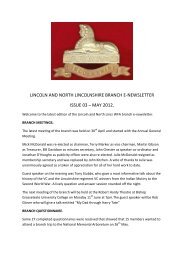
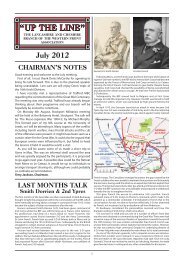
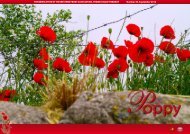
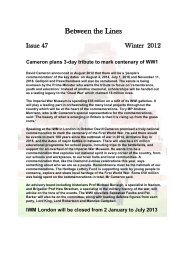

![Fromelles Australian Working List[1].pdf - The Western Front ...](https://img.yumpu.com/29972632/1/184x260/fromelles-australian-working-list1pdf-the-western-front-.jpg?quality=85)
